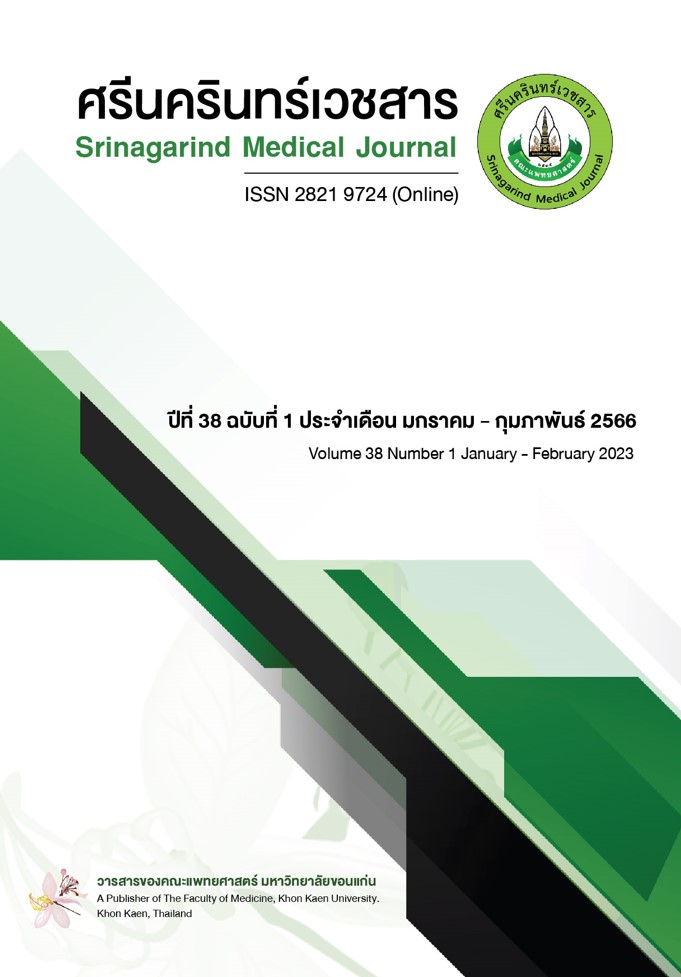Satisfaction and Nasolabial Appearance of Patients with Cleft Lip and Cleft Palate Aged 16-20 Years
Keywords:
satisfaction, nasolabial appearance, cleft lip and palateAbstract
Background and Objective: Cleft Lip-Palate (CLP) affect quality of life (QoL) of the patients, especially in the age group of 16-20 years, therefore, assessing satisfaction and nasolabial appearance is important.
Materials and Methods: A Cross-sectional study was performed on patients with CLP who continuously underwent surgery with Tawanchai Center. Purposive sampling was used to choose 32 patients. Surveys and 41 of 5-aspect satisfaction questions were used to collect information, then analyzed using percentage, mean, standard deviation, and Independent t-test.
Results: 59.37% of patients were female. All patients had an average age of 18.33 years. 68.75% of the patients have unilateral CLP. 81.25% of the patients received Alveolar Bone Graft surgery. Five of satisfaction aspects were: 1. Medical treatment 2. Service 3. Medical fees 4. Psychosocial, which found that patients’ average satisfaction was at a high level at 4.17±0.74, 4.47±0.59, 3.57±0.80, 3.67±0.85, respectively, and 5. Impact on patient’s family, which found that the overall effect CLP had were minimal, but when comparing the difference of satisfaction between male and female patients, the satisfaction in medical treatment and overall satisfaction level were statistically different. (95 CI = -5.64-0.28, p = 0.03)
Conclusion: Assessment of the patient satisfaction in 5 aspects had a high level, the impacts of CLP had on the families were at a low level. Female patients had a higher average satisfaction than that of their male counterparts. Continual quality of care improvement is necessary to the interdisciplinary team to continue spreading the opportunity to reach as many patients as possible.
References
Sinko K, Jagsch R, Prechtl V, Watzinger F, Hollmann K, Baumann A. Evaluation of esthetic, functional, and quality-of-life outcome in adult cleft lip and palate patients. Cleft Palate Craniofac J 2005;42(4):355–61.
Mikalsen ÅKR, Folstad I, Yoccoz NG, Laeng B. The spectacular human nose: an amplifier of individual quality? Peer J 2014;2:e357.
Richman LC. Self-reported social, speech, and facial concerns and personality adjustment of adolescents with cleft lip and palate. Cleft Palate J 1983;20(2):108–12.
Millard T, Richman LC. Different cleft conditions, facial appearance, and speech: relationship to psychological variables. Cleft Palate Craniofac J 2001;38(1):68–75.
Gkantidis N, Papamanou DA, Karamolegkou M, Dorotheou D. Esthetic, functional, and everyday life assessment of individuals with cleft lip and/or palate. BioMed Res Int 2015;2015: e510395.
Ravikumar A, Balan R, Venkatramanan P. Self-perceived health related quality of life in adolescents with repaired cleft lip and palate. Int J Contemp Pediatr 2017;4(4):1263-6.
Crerand CE, Sarwer DB, Kazak AE, Clarke A, Rumsey N. Body image and quality of life in adolescents with craniofacial conditions. Cleft Palate Craniofac J 2017;54(1):2-12.
Thittiwong R, Manosudprasit M, Wangsrimongkol T, Kongsomboon S, Pitiphat W, Chowchuen B, et al. Evaluation of facial appearance among patients with repaired unilateral cleft lip and palate: comparison of patient- and clinician-ratings of satisfaction. J Med Assoc Thai 2015;98 (Suppl 7): 68-76.
Klassen AF, Tsangaris E, Forrest CR, Wong KW, Pusic AL, Cano SJ, et al. Quality of life of children treated for cleft lip and/or palate: a systematic review. J Plast Reconstr Aesthet Surg 2012;65(5):547-57.
Broder HL, Wilson-Genderson M. Reliability and convergent and discriminant validity of the Child Oral Health Impact Profile (COHIP Child's version). Community Dent Oral Epidemiol 2007;35(Suppl 1):20-31.
Sinko K, Jagsch R, Prechtl V, Watzinger F, Hollmann K, Baumann A. Evaluation of esthetic, functional, and quality-of-life outcome in adult cleft lip and palate patients. Cleft Palate Craniofac J 2005;42(4):355-61.
Surakunprapha P, Pradubwong S, Paggasang Y, Jenwitheesuk K, Pisek P, Chowchuen B. Treatment outcomes of quality of life and nasolabial appearance in patients with cleft lip and palate of 10-year-old group. Srinagarind Med J 2021;36(3):340-6.
Thittiwong R, Manosudprasit M, Wansrimongkol T, Kongsomboon S, Pitiphat W, Chowchuen B, et al. Evaluation of facial appearance among patients with repaired unilateral cleft lip and palate: comparison of patient- and clinician-ratings of satisfaction. J Med Assoc Thai 2015; 98(7):68-76.
Patjanasoontorn N, Pradubwong S, Mongkolthawornchai S, Phetcharat T, Chowchuen B. Development and reliability of the THAICLEFT quality of life questionnaire of children with cleft lip/palate and families. J Med Assoc Thai 2010;93(4):16-8.
National Health Security office. Operations manual of beautiful smile, beautiful voice project, ministry of public health, The Thai Red Cross Society. 2nd ed. Work print Limited: Bangkok; 2007.
Tawanchai foundation. History [Internet]. 2022 [cited 2022 Jul 6]. Available from: https://www.tawanchai-foundation.org/about-us/background/
Downloads
Published
How to Cite
Issue
Section
License
Copyright (c) 2023 Srinagarind Medical Journal

This work is licensed under a Creative Commons Attribution-NonCommercial-NoDerivatives 4.0 International License.




